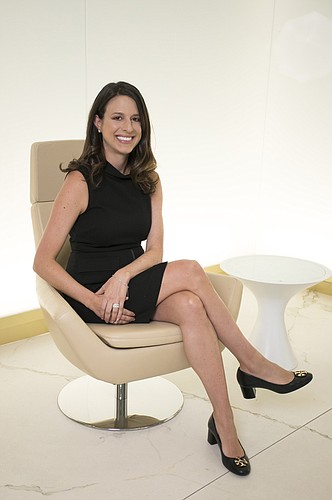- November 25, 2024
-
-
Loading

Loading

St. Petersburg tech firm CaseGlide aims to solve one of the great mysteries of our time: how lawyers bill for their work. Specifically, how they bill insurance companies, many of which are involved in multiple lawsuits at any given moment.
The company was founded not by reform-minded techies, however, but a husband-and-wife team of former attorneys who enjoyed successful careers in insurance defense before taking the risk of starting their own software enterprise.
“We are running a software company and we’re not technical at all,” says CaseGlide COO Carly Todd, 35. (Her husband, Wesley, also 35, is the CEO of the privately held company, which declines to disclose revenues but says sales have grown 50% year-over-year since 2016.) “We were lucky enough to find great technology partners who were able to bring our idea to life.”
“We can scorecard attorneys based on things like average settlement amount, average legal fees, average duration of a case, closure ratio.” Carly Todd, COO of CaseGlide
That idea, essentially, is a Software-as-a-Service platform that helps insurers and self-insured claims organizations manage and reduce spending on legal work. Instead of a lawyer emailing an occasional billing update, attorney and client communicate with each other via the CaseGlide system, which provides transparency as to what particular services are being rendered — “matter management,” in CaseGlide parlance — and the exact fees associated with each task. It also provides insurance companies with valuable insights as to which cases they should prioritize over others.
“There’s really no workflow involved,” Carly Todd says of the way in which insurance cases have traditionally been managed and billed. “What CaseGlide does is it creates a workflow and asks the attorneys to set the strategy up front, say, ‘Well, this is the case that we think is going to settle at mediation,’ or ‘This case is going to go to trial.’”
CaseGlide was founded in 2015 with money from the Todds’ personal funds. Today it employs a staff of 15 and has secured about 20 clients, insurance firms, mostly, that have used it for more than 100,000 cases. In October, it received funding from Acadian Software, a tech-focused venture capital firm. Carly Todd declines to say how much Acadian invested, but says she and Wesley will retain majority ownership in the firm.
With some validation of the concept from investors, CaseGlide, says Todd, must find a way to step up sales and marketing efforts and continue to build its team. She and her husband are still going through a learning process when it comes to being entrepreneurs and figuring out what customers want from them — and using that information to fine-tune their messaging.
With that goal in mind, they’re doing the No. 1 form of market research: listening to customers.
“What we’ve learned was that different people were purchasing the software for different reasons,” Todd says. “Some wanted the cost savings, but some just wanted the transparency; some wanted the ability to know what they were paying their lawyers or they wanted to see their lawyer’s performance, or how one lawyer is performing as opposed to another. So there were many different things that appealed to different decision makers.”
Todd’s summary raises an important point of distinction: Not only can CaseGlide keep lawyers on task and budget, but using deep data analytics, it can also provide attorney ratings and evaluations.
“Using the data we're compiling in every individual lawsuit, we can scorecard attorneys based on things like average settlement amount, average legal fees, average duration of a case, closure ratio,” Todd says. “So when an insurer looks to assign out a new lawsuit that they’ve received, they can look at attorney scorecards to figure who they should assign it to, or who's performing well on a particular type of case.”
CaseGlide faces competition from other Software-as-a-Service entities. But Todd says its closest rivals focus only on cost savings, instead of the added value of functions like attorney scorecards. “Those solutions are reactive, not proactive," she says. "They can reduce a legal invoice but they can’t influence the outcome of the law.”
In other words, CaseGlide, she claims, helps clients win.
That’s a great marketing pitch, but will it face pushback from the Todds’ former colleagues in the insurance defense world? Carly Todd doesn’t think so.
“That’s a good question,” she says. “Lawyers have been supportive ... they find that it makes their job easier because they know what their clients expect of them now.”
Todd concedes that lawyers might bill less, per case, but overall they will get more cases if they perform well. “It’s a win-win for everybody.”